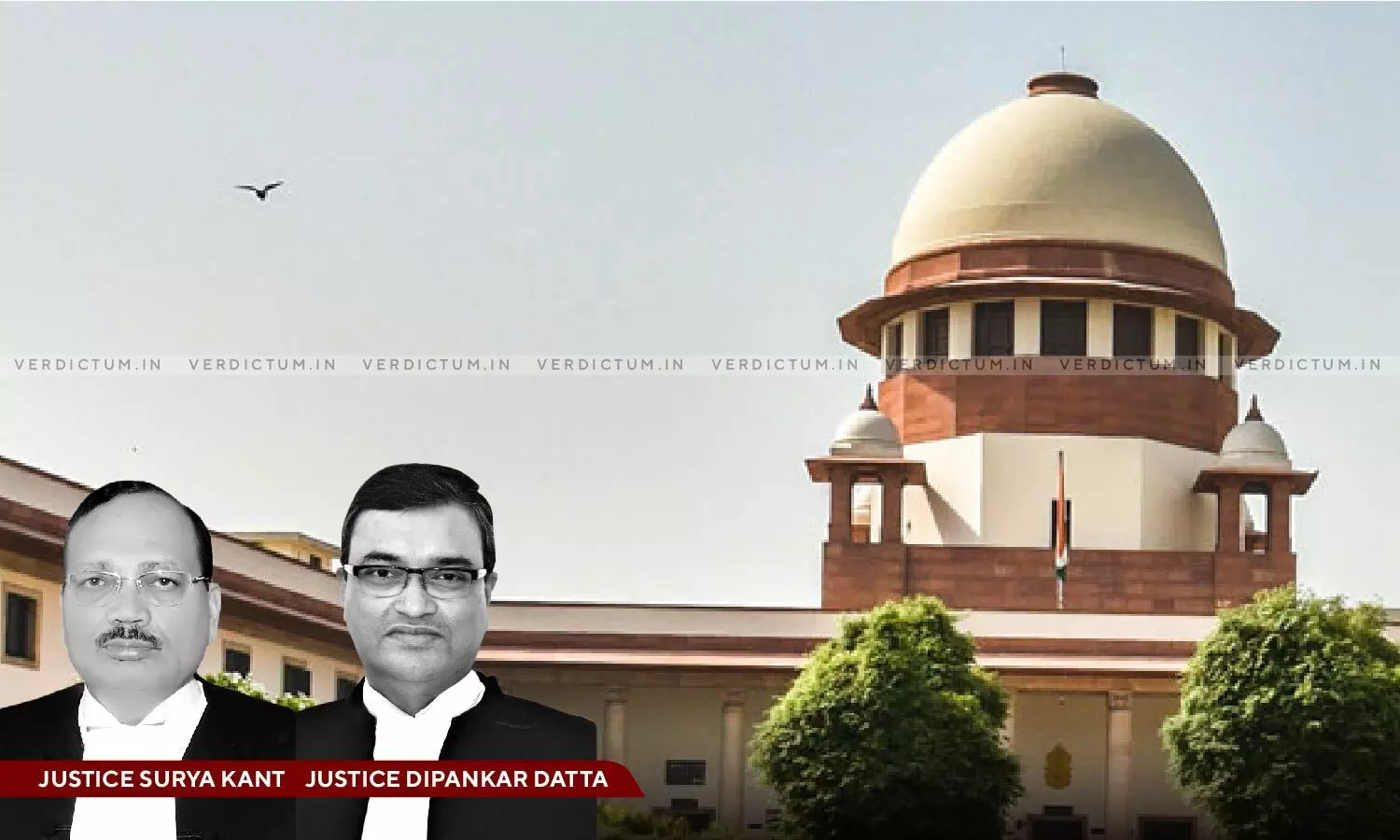
Fact That Deceased Was Living As `Ghar Javai’ With Appellant Indicates He Didn't Have Premeditated Intention To Murder His Son-In-Law: SC Alters Conviction From 302 To 304 IPC
 |
|The Supreme Court has altered conviction and reduced the sentence of a man who was convicted for killing his alcoholic son-in-law who lived as ‘ghar javai’ and misbehaved with the family members. The said man had filed a criminal appeal against the judgment of the Gauhati High Court by which his conviction under Section 302 of the Indian Penal Code (IPC) and sentence to undergo life imprisonment were upheld.
The two-Judge Bench of Justice Surya Kant and Justice Dipankar Datta said, “In the facts and circumstances of the present case, as noticed above, it appears to us that the act of the appellant in causing injuries to the deceased falls within the expression of `culpable homicide’ which does not amount to `murder’. We hold accordingly. The impugned judgments of the Trial Court as well as the High Court are modified to that extent. … In our considered opinion, the ends of justice would be adequately met by converting the sentence of life imprisonment awarded to the appellant to rigorous imprisonment of ten years.”
The Bench took note of the fact that the accused attacked the deceased without any intention to commit his murder and it was rather a crude attempt to forcibly change the deceased’s habits and help his daughter to have peaceful and dignified life.
Advocate Gaurav Agarwal appeared on behalf of the appellant/accused while Senior Additional Advocate General Nalin Kohli appeared on behalf of the State/respondent.
In this case, the son-in-law (deceased) of the accused was allegedly assaulted and killed by him with a bamboo stick and such an incident took place inside the accused’s house. Following the registration of the FIR, the accused was arrested and a chargesheet under Section 302 of IPC was filed against him. The accused’s wife supported the prosecution’s case to the extent that her son-in-law was killed by him, however, she did not witness the occurrence.
The accused’s daughter during cross-examination had admitted that her husband was an alcoholic and used to quarrel with her and family after consuming alcohol. The accused and the deceased were the only ones present in the house at the time of the incident. The Trial Court based on the postmortem report held the accused guilty of committing an offence under Section 302 IPC and consequently sentenced him for life imprisonment.
The Supreme Court after hearing the contentions of the counsel observed, “It seems to us from the version of P.W.6 that the deceased was an alcoholic and he used to misbehave not only with his wife but also with her family members. This version deserves appreciation in its right perspective. Such being the conduct of the deceased, the appellant’s only concern was to protect the life and dignity of his daughter, who was his only child. Reading the evidence on record, it is perceived that the appellant just wanted to create some kind of psychological fear and restraint in the deceased’s mind, so that he could no longer assault or humiliate the appellant’s daughter.”
The Court further noted that the daily consumption of liquor by the deceased was an apparent factor that exhorted the appellant to assault the deceased not with an intent to commit his murder but only to force the deceased to mend his ways and mend his drinking problem.
“The appellant’s motive at best was to prevent the deceased from misbehaving with his daughter after consuming alcohol. The manner in which the occurrence appears to have taken place inside the house, does indicate that the appellant lost his self-control on account of persistent provocation and suddenly thrashed his son-in-law with the bamboo stick. It is a case where provocation seems to be brewing up since the deceased shifted to the appellant’s house”, said the Court.
The Court also observed that the fatal occurrence was seemingly the final culmination of loss of the power of self-control and the fact that the deceased was living as a ‘ghar javai’ with the appellant, indicates that the appellant did not have any pre-meditated intention to commit the murder of his son-in-law.
“… for the continuous harassment of the appellant’s daughter by the deceased who was a habitual drunkard, the appellant would not have lost his senses suddenly. The simmering discontent of a frustrated and hapless father unfortunately led him to strike the deceased with a bamboo stick. The series of provocative acts attributable to the deceased indeed laid the foundation of sustained provocation”, said the Court.
The Court added that the act of the appellant in causing injuries to the deceased falls within the expression of `culpable homicide’ which does not amount to `murder’ (punishable under Section 304 of the IPC). It, therefore, reduced the sentence of the appellant from life imprisonment to rigorous imprisonment of 10 years.
Accordingly, the Apex Court partly allowed the appeal and modified the conviction and sentence of the appellant.
Cause Title- Markash Jajara v. The State of Assam & Anr. (Neutral Citation: 2023 INSC 1015)